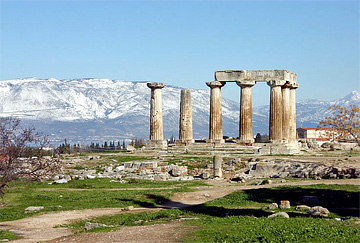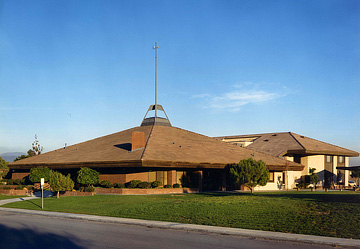During my years as Senior Pastor of Irvine Presbyterian Church, every once in a while I’ll hear somebody refer to the church as “Mark’s church.” Though I understood the shorthand, nevertheless it grated on my soul like fingernails on a spiritual blackboard. During my years as a Christian, I’ve seen cases where churches are so identified with the pastor that things are way out of balance. A church that belongs to God ends up being spoken of, and sometimes even thought of, as the personal property of some individual. The identity of pastor and church are so intertwined that it’s almost impossible to think of them as distinct. That which exists for the sake and glory of Christ ends up as a personality cult with the pastor as the dominant star. So, when somebody called Irvine Presbyterian Church “Mark’s church,” my warning lights flashed like Las Vegas at night.
 The tendency of Christians to over-identify with their leaders is an old one. In fact, it goes back to the earliest years of the church. In the letter we know as 1 Corinthians, Paul gets right to the point after his opening address:
The tendency of Christians to over-identify with their leaders is an old one. In fact, it goes back to the earliest years of the church. In the letter we know as 1 Corinthians, Paul gets right to the point after his opening address:
Now I appeal to you, brothers and sisters, by the name of our Lord Jesus Christ, that all of you be in agreement and that there be no divisions among you, but that you be united in the same mind and the same purpose. For it has been reported to me by Chloe’s people that there are quarrels among you, my brothers and sisters. What I mean is that each of you says, “I belong to Paul,” or “I belong to Apollos,” or “I belong to Cephas,” or “I belong to Christ.” (1:10-12)
Fundamental to the divisions and disagreements in the Corinthian church was the tendency for the different “parties” to identify with some Christian leader over and against the others. It’s easy to understand how this could happen, especially when you consider that in some of the pagan mystery religions the person who guided you into the mysteries held a special place in your heart.
Of course love and appreciation for Christians leaders is a fine thing. But when this love and appreciation becomes divisive or idolatrous, then we have a real problem. In Corinth, the different “leader parties” were splitting the church, with people claiming allegiance to their particular hero rather than embracing the whole church of Jesus Christ.
In 1 Corinthians 3 Paul seeks to set the Corinthians right by helping them to have a right understanding of Christian leadership:
What then is Apollos? What is Paul? Servants through whom you came to believe, as the Lord assigned to each. I planted, Apollos watered, but God gave the growth. So neither the one who plants nor the one who waters is anything, but only God who gives the growth. The one who plants and the one who waters have a common purpose, and each will receive wages according to the labor of each. For we are God’s servants, working together; you are God’s field, God’s building. (3:5-9)
It seems that the Corinthians were divided especially into the group that supported Paul and the group that identified with Apollos, a more articulate preacher and one who might have had greater appeal among the more educated and wealthier Corinthians. Yet in their devotion to a human leader, the Corinthians were missing the point. Both Paul and Apollos were equally servants of God though they may have different functions. Moreover, they shared in the common purpose of building a church for God’s purposes. Yet the major point Paul makes is that the servants aren’t the main thing at all. God is the main thing. God is the Master of the servants. God is the only one who can cause the church to grow. God is the owner of the church, whether seen as a field or a building.
Paul wraps up his argument in verse 21 with a simple imperative: “So let no one boast about human leaders.” Though appreciation of leaders is fine, this must not run over into bragging or anything that would divide the church.
Here is a measure for determining the health of leadership in a church: How do the members talk about the leaders? Are they drawing up sides for and or against their leaders? Do they pit some leaders against others? Or do they see all leaders as servants of the One who really matters?
I confess that, during my years as pastor of Irvine Presbyterian Church, I found it easy to get too entangled with the church I served. I could even begin to think of Irvine Presbyterian Church as “my church” in a way that wasn’t healthy. For me, this wasn’t so much about my glory as about an overactive sense of responsibility. Though God had called me to the Irvine church and though he blessed my ministry there, I was not nearly as essential to the church as I might have thought. God could take care of this church just fine without me. Though God used me at Irvine, I was not necessary to the life and health of the church. This has been demonstrated in the three years since I’ve been away from Irvine Pres, which is now being led by a fine new pastor, Scott Bullock.
In practice, it sometimes is not easy for a pastor or other leader to seek the glory of Christ in a church, especially when we find ourselves in the midst of conflict. In tomorrow’s post I’ll illustrate this reality from my own pastoral experience.

